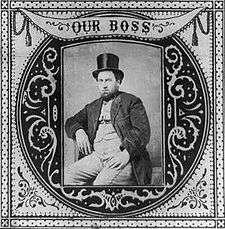Political boss
In politics, a boss is a person who controls a faction or local branch of a political party. They do not necessarily hold public office themselves; most historical bosses did not, at least during the times of their greatest influence. Numerous officeholders in that unit are subordinate to the single boss in party affairs. Bosses may base their power on the support of numerous voters, usually organized voting blocs, and manage a coalition of these blocs and various other stakeholders. When the party wins, they typically control appointments in their unit, and have a voice at the higher levels. Reformers typically allege that political bosses are corrupt. This corruption is usually tied to patronage; the exchange of jobs, lucrative contracts and other political favors for votes, campaign contributions and sometimes outright bribes.
- For the similar term, see Crime boss.

History
The appearance of bosses has been common since the Roman Republic, and remains fairly common or maybe widespread today. In Spanish America, Brazil, Spain, and Portugal political bosses called caciques hold power in many places;[1] while in Italy they are often referred to as ras.[2] Bosses were a major part of the political landscape during the 19th and early 20th centuries in the United States, such as the political machine of Tammany Hall, which controlled financing of campaigns and influence via owing of favors to arrange patronage public appointments.
In the Southern United States, charismatic populist politicians like Huey Long commanded large networks of supporters. Similar practices existed in the northern cities, particularly New York City, where Boss Tweed (arguably the most infamous political boss) wielded control over the powerful Democratic political machine. In Denver, Colorado during the 1890s there was Jefferson Randolph "Soapy" Smith who operated as the Republican party boss and political fixer.
Charles Brayton exercised great influence over the politics of turn of the 20th century Rhode Island.[3] He exemplified rural bossism within the Republican Party. Chicago had numerous colorful bosses, such as Democrats Hinky Dink and Bathhouse John.[4] Chicago's Republican counterparts included Big Bill Thompson, who became mayor in the 1920s.[5] One of Chicago's most iconic figures was longtime mayor and chairman of the Cook County Democratic Committee Richard J. Daley,[6] who had a major voice in state and national Democratic politics. With a few exceptions in the Southwest, such as Phoenix, most large cities of 100,000 or more in the early 20th century had machine organizations, and usually claimed one or more local bosses, most of which were Democrats. Some had a major impact and hold on state politics, such as E. H. Crump in Memphis, Tennessee.[7] A few bosses had reputations as reformers, such as Frank Hague of Jersey City.[8]
Popular culture
The HBO television series Boardwalk Empire focuses on Enoch "Nucky" Thompson (based on the historical Enoch L. Johnson), a Republican Party boss and gangster who controls Atlantic City, New Jersey during the Prohibition period of the 1920s and 1930s.
Boss Hogg was played by Sorrell Booke in the television series The Dukes of Hazzard.
Boss Tweed was played by Philip Bosco in the 1986 TV movie Liberty,[9] and by Jim Broadbent as a major supporting character in the 2002 film Gangs of New York.[10] Tweed is portrayed as a defender of the rights of minorities and helper of those in need in Pete Hamill's 2003 novel Forever.
Notable individuals
- Bob Brady (b. 1945)
- Boss Cox (1853–1916)
- Richard Croker (1843–1922)
- Richard J. Daley (1902–1976)
- Tom Dennison (1858–1934)
- Carmine DeSapio (1908–2004)
- Johnny Dougherty (b. 1960)
- Meade Esposito (1907–1993)
- James A. Farley (1888–1976)
- Frank Hague (1876–1956)
- Enoch L. Johnson (1883–1968)
- Huey Long (1893–1935)
- Joseph M. Margiotta (1927–2008)
- John J. McClure (1886-1965)
- Alexander McKenzie (politician) (1851-1922)
- Hugh McLaughlin (1827–1904)
- George Norcross (b. 1956)
- Frank Rizzo (1920-1991)
- Alexander Robey Shepherd
- John F. Street (b. 1943)
- Tom Pendergast (1873–1945)
- John S. Williams (1835-1887)
- Boss Tweed (1823–1878)
- William Scott Vare (1867-1934)
In the United Kingdom:
- Archibald Salvidge (1863-1928)
References
- Specific
- Robert Kern, The caciques: oligarchical politics and the system of caciquismo in the Luso-Hispanic world. Albuquerque, University of New Mexico Press [1973]
- I ras del voto "personale" che ondeggiano tra gli schieramenti
- John D. Buenker, "The Politics of Resistance: The Rural-Based Yankee Republican Machines of Connecticut and Rhode Island". New England Quarterly (1974): 212–237.
- Lloyd Wendt, and Herman Kogan, Lords of the Levee: The story of Bathhouse John and Hinky Dink (1944).
- Douglas Bukowski, Big Bill Thompson, Chicago, and the politics of image (1998).
- Mike Royko, Boss: Richard J. Daley of Chicago (1971)
- G. Wayne Dowdy, Mayor Crump Don't Like It: Machine Politics in Memphis (Univ. Press of Mississippi, 2006)
- Mark S. Foster, "Frank Hague of Jersey City: 'The boss' as reformer." New Jersey History 86#2 (1968): 106–117.
- "Characters: Boss Tweed" on IMDb
- Ebert, Roger (2002-12-20). "Gangs of New York". suntimes.com. Retrieved 2009-05-17.
- General
- H. F. Gosnell, Machine Politics (1937, repr. 1968);
- S. Lubell, The Future of American Politics (3d ed. 1965);
- E. C. Banfield and J. Q. Wilson, City Politics (1963, repr. 1966)